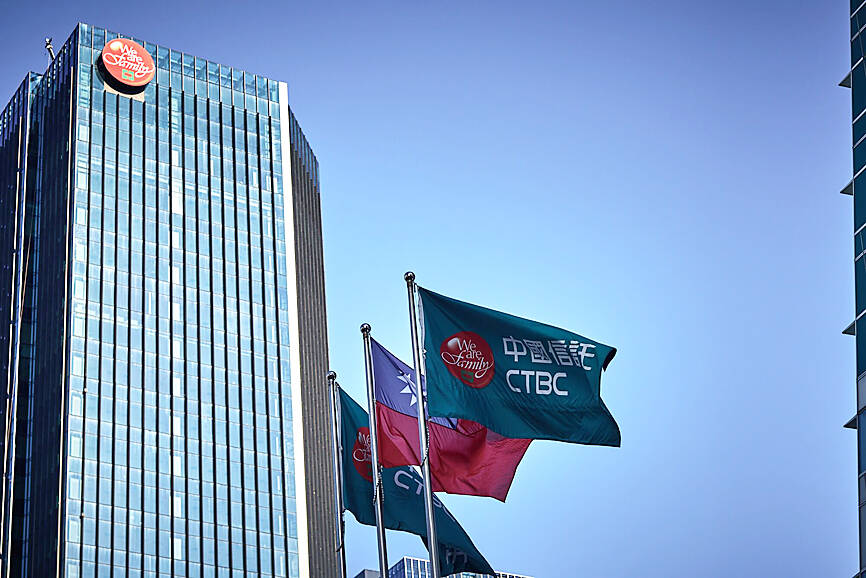CTBC Bank Co (中國信託銀行), the flagship banking arm of CTBC Financial Holding Co (中信金控), has obtained approval from the Financial Supervisory Commission (FSC) to open a representative office in Houston, Texas, the commission said yesterday.
CTBC Bank’s operations in the US consist of a subsidiary and a representative office in Los Angeles, and a branch in New York.
To provide financial services to more Taiwanese investors and help them extend their reach in the US market, the bank plans to set up a representative office in Houston, the FSC said in a statement.

Photo: An Rong Xu, Bloomberg
Taiwanese banks are allowed to open a representative office in foreign markets first to collect market information before the office is upgraded into a branch.
A total of 25 Taiwanese banks have branches in the US market, with three having subsidiaries in place and an additional three running representative offices there, the commission said.
In Texas alone, two Taiwanese banks have branches, it said.
As of December last year, CTBC Bank has 12 branches in overseas markets, including New Delhi; Sriperumbudur, India; New York; Tokyo; Ho Chi Minh City, Vietnam; Singapore; Shanghai; Guangzhou; Xiamen; Shenzhen; and two in Hong Kong.
The bank also has subsidiaries in Indonesia, the Philippines, Canada, the US, Japan and Thailand, and representative offices in Bangkok, Hanoi, Beijing, Los Angeles, Kuala Lumpur, Sydney and Yangon, Myanmar.
Last year, CTBC Bank’s pretax profit generated from overseas markets topped NT$20 billion (US$615.54 million), accounting for more than 30 percent of its total pretax profit of NT$62.83 billion.

WEAKER ACTIVITY: The sharpest deterioration was seen in the electronics and optical components sector, with the production index falling 13.2 points to 44.5 Taiwan’s manufacturing sector last month contracted for a second consecutive month, with the purchasing managers’ index (PMI) slipping to 48, reflecting ongoing caution over trade uncertainties, the Chung-Hua Institution for Economic Research (CIER, 中華經濟研究院) said yesterday. The decline reflects growing caution among companies amid uncertainty surrounding US tariffs, semiconductor duties and automotive import levies, and it is also likely linked to fading front-loading activity, CIER president Lien Hsien-ming (連賢明) said. “Some clients have started shifting orders to Southeast Asian countries where tariff regimes are already clear,” Lien told a news conference. Firms across the supply chain are also lowering stock levels to mitigate

Six Taiwanese companies, including contract chipmaker Taiwan Semiconductor Manufacturing Co (TSMC, 台積電), made the 2025 Fortune Global 500 list of the world’s largest firms by revenue. In a report published by New York-based Fortune magazine on Tuesday, Hon Hai Precision Industry Co (鴻海精密), also known as Foxconn Technology Group (富士康科技集團), ranked highest among Taiwanese firms, placing 28th with revenue of US$213.69 billion. Up 60 spots from last year, TSMC rose to No. 126 with US$90.16 billion in revenue, followed by Quanta Computer Inc (廣達) at 348th, Pegatron Corp (和碩) at 461st, CPC Corp, Taiwan (台灣中油) at 494th and Wistron Corp (緯創) at

NEW PRODUCTS: MediaTek plans to roll out new products this quarter, including a flagship mobile phone chip and a GB10 chip that it is codeveloping with Nvidia Corp MediaTek Inc (聯發科) yesterday projected that revenue this quarter would dip by 7 to 13 percent to between NT$130.1 billion and NT$140 billion (US$4.38 billion and US$4.71 billion), compared with NT$150.37 billion last quarter, which it attributed to subdued front-loading demand and unfavorable foreign exchange rates. The Hsinchu-based chip designer said that the forecast factored in the negative effects of an estimated 6 percent appreciation of the New Taiwan dollar against the greenback. “As some demand has been pulled into the first half of the year and resulted in a different quarterly pattern, we expect the third quarter revenue to decline sequentially,”

ASE Technology Holding Co (ASE, 日月光投控), the world’s biggest chip assembly and testing service provider, yesterday said it would boost equipment capital expenditure by up to 16 percent for this year to cope with strong customer demand for artificial intelligence (AI) applications. Aside from AI, a growing demand for semiconductors used in the automotive and industrial sectors is to drive ASE’s capacity next year, the Kaohsiung-based company said. “We do see the disparity between AI and other general sectors, and that pretty much aligns the scenario in the first half of this year,” ASE chief operating officer Tien Wu (吳田玉) told an